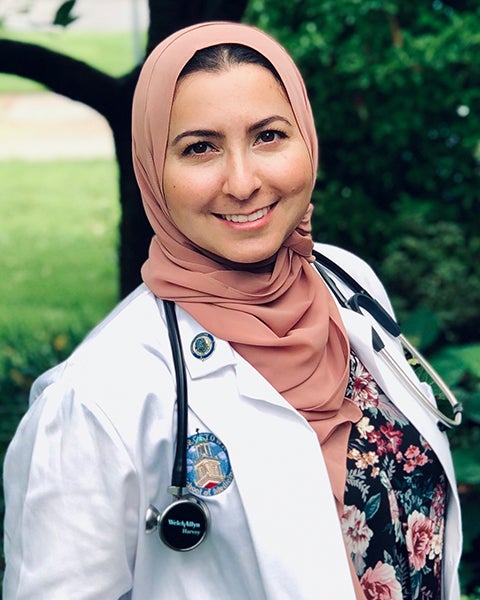School of Medicine Adds Environmental Health and Medicine Track

Posted in GUMC Stories | Tagged environmental health, Environmental Health and Medicine longitudinal academic track, medical education, School of Medicine, sustainability
(April 22, 2022) — Health care providers will increasingly encounter patients who have been affected by environmental factors as the effects of climate change grow, including climate migration and expanding infectious diseases. With the new Environmental Health and Medicine longitudinal academic track, Georgetown medical students now have the option to receive additional training to address those factors.
Students who are admitted to the track will learn how to take patient histories that include environmental factors that affect health, educate patients about risks and advocate on their behalf, and explore strategies for reducing the environmental impact of medical facilities. They will also have opportunities to volunteer for an environmental health cause and complete a relevant capstone project. The concentration is now one of eight longitudinal tracks offered by the School of Medicine, allowing students to explore a particular focus in conjunction with the four-year medical curriculum.
Its creation is one of a growing number of efforts to promote environmental research, education and action at Georgetown, including Earth Commons, Georgetown’s Institute for the Environment & Sustainability, which launched in February. The institute will provide a university-wide focus on those issues and build on the interdisciplinary work of the Georgetown Environment Initiative.


Created by Students
Ruba Omeira (M’24) and Vasalya Panchumarthi (M’24), who both served in leadership positions in the Georgetown Climate Health and Medical Sustainability Club, conceived the idea of the track and were instrumental in developing it for approval. In their proposal, they pointed out that the American Medical Association has promoted integrating climate health topics into medical education curriculum since 2019, yet that and environmental topics are not usually discussed during medical training.
While Omeira and Panchumarthi had success in getting their professors to include some examples of environmental health issues in the pre-clinical curriculum, “we wanted to create something more permanent,” Omeira said. Their proposal was approved a few weeks before the deadline for students to apply to join tracks in the fall of 2021, and the inaugural class, which includes them both, is currently underway.
“We’re really excited about this, because there’s a lot of topic areas we want to delve into,” Omeira said. “This first year will include lectures on environmental injustices, pharmaceuticals and the environment, how toxins affect physical systems, including allergies, and the effects of wildfire on respiratory health.”
Advocacy and action are also important components of the track. “We are planning to have an op-ed writing workshop, and teach students how to lobby and write a bill themselves, to get them thinking about what can be done,” Panchumarthi said.
Addressing Patients’ Needs
Shiloh Jones, PhD, associate professor and director of medical gross anatomy, is the director of the Environmental Health and Medicine track. “I was surprised to find out how much of an interest there is among the faculty in climate health and clinical health, and it’s because they’re seeing it,” Jones said. “Tropical diseases we didn’t used to see in the U.S. — patients are getting them. Climate migrants are coming to our communities, being treated by our physicians.”

The participating students’ fourth-year capstone projects could address some of those issues in a way that will help raise awareness, such as creating a video series on an environmental health topic, conducting a waste audit of a medical facility, creating a public health campaign, or developing a case review of a climate refugee.
Jones hopes students who participate in the track will gain the knowledge and experience about talking to patients about environmental issues and also how those issues affect them. “Climate change in general is such a polarized topic, and there’s some data suggesting people are more likely to trust their physicians” than more political speakers, Jones said, giving them a unique opportunity to educate their patients about the risks they face.
It’s also important for the future physicians to learn to speak up on their patients’ behalf, she said. “Many polluting industrial facilities are located in areas where residents don’t have the money or political influence to fight them, and maybe they need the jobs. But they can bring asthma, pollution and other problems,” Jones said. “We need to advocate for those who can’t as effectively.”
Kathleen O’Neil
GUMC Communications
